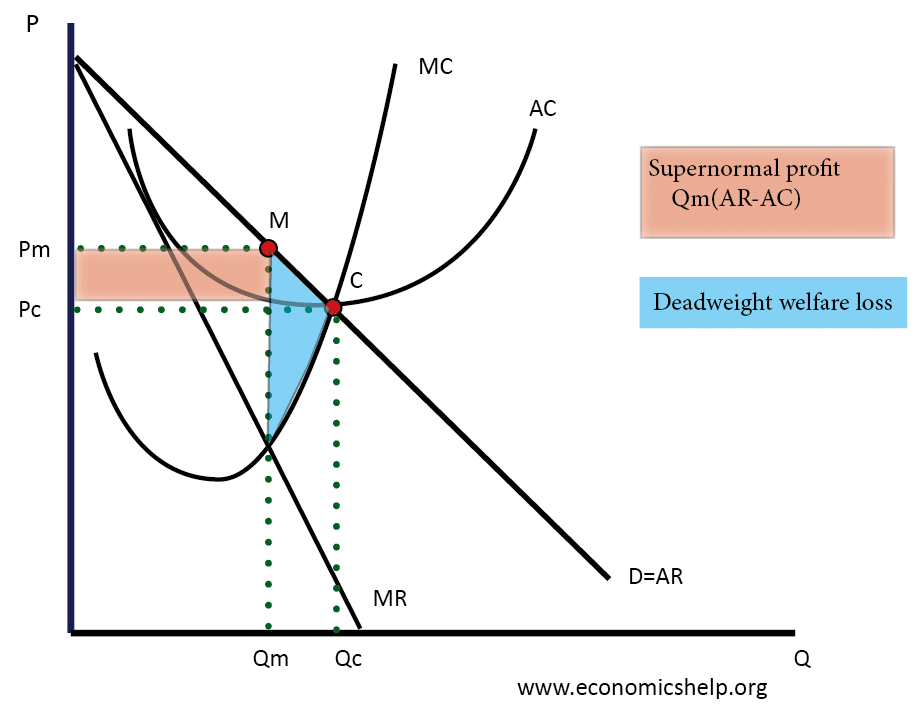Federal control over an entire industry much like weve done with the United States Postal Service is effectively the prohibition of competition from the private sector. The benefit is that it increases incentives for creative activity the disadvantage is that inventor can charge as much as wanted or that consumers are willing to pay.
Essentially governments create monopolies to keep the prices of such amenities within all consumers reach.

. The easiest and most straightforward way to create a monopoly is to simply write the monopoly into law. The government can create a monopoly by giving a single firm the exclusive right to produce some good. Monopolies are created for many reasons.
When the government allows or creates a monopoly within a market that is in essence a government monopoly. But dont ever reference the USPS. Why might the government create one.
Monopolies are created for many reasons. The government can create a monopoly by giving a single firm the exclusive right to produce some good. Up to 25 cash back A government run monopoly is one that is formed and run by the government rather than allowed to exist in the private sector.
The government can create a monopoly by giving a single firm the exclusive right to produce some good. Even if the gerrymandering could be eliminated the majority-rule principle would remain a source of monopolistic abuse based on monopoly power granted and enforced by government. When Microsoft Met the FTC.
When an industry is characterized by high fixed costs a single firm can usually supply the entire market at a lower cost than having multiple firms in the industry. Also the housing markets in the United States are controlled by tightly regulated zoning laws. In order to create monopolies government would set up some legal barriers such as the government franchise grants monopoly rights to private companies for example.
They are formed out of necessity where competition would be damaging to the standard of living rather than a protection from monopolistic abuse of power. Monopolies are the product of government regulation and intervention. One important one is the.
A The government can create a monopoly by granting exclusive rights to a single corporation to produce a certain good. A government monopoly or public monopoly is a form of coercive monopoly in which a government agency or government corporation is the sole provider of a particular good or service and competition is prohibited by law. See full answer below.
It is a monopoly created by the government. Freddie Mac and Fannie Mae literally control the outflow of funds to the markets. A union may be certified exclusive representative in a 1000-man bargaining unit on the basis of as few as 301 affirmative votes for an election will be considered valid in such a unit when 600.
Monopolies are created for many reasons. The ways in which Government can reduce the ill effects of a monopoly is summarised as follows. Government Created Monopolies.
The government is either directly or indirectly the only provider of a necessary service or product and other competition is not allowed. Paul explains that government control in industries that are heavily regulated is a direct cause for market share monopolization. When the government allows or creates a monopoly within a market that is in essence a government monopoly.
The government can regulate monopolies through. The government is either directly or indirectly the only provider of a necessary service or product and other competition is not allowed. 28 July 2019 by Tejvan Pettinger.
An example of a government created monopoly is when the government grants patents to inventors. In economics a government monopoly or public monopoly is a form of coercive monopoly in which a government agency or government corporation is the sole provider of a particular good or service and competition is prohibited by law. Patent laws also provide the government sole ownership of inventions which helps to avoid market failure that would otherwise occur in.
From economics stand point government-created monopoly is a firm or individual given the exclusive right by the government to produce or supply a particular good or service Wolfstetter 2008. The government may wish to regulate monopolies to protect the interests of consumers. Price capping limiting price increases.
Therefore the government has assumed the responsibility of preventing the formation of monopolies and curbing unfair practices of large corporations. The easiest way to become a monopoly is by the government granting a company exclusive rights to provide goods or services. Government should also take into consideration the cost involved in breaking a monopoly.
Up to 256 cash back Describe how government is involved in creating a monopoly. America was founded on the principle of free trade and freedom of competition. Regulation of monopoly.
Strengthening existing competition by providing required funds at cheaper rate of interest and setting up financial aids. Thats what former libertarian Republican presidential hopeful and 12-term Congressman Ron Paul argues in a 2016 nationally syndicated op-ed published by USA Today. History of Antitrust Regulation.
The most common way in which a monopoly would be created is by the government not allowing private firms to enter a market. One important one is the recognition that a single firm in industries characterized by high fixed costs can usually supply the entire market at a lower cost than multiple firms in the industry. For example monopolies have the market power to set prices higher than in competitive markets.
Government-created monopoly enjoys an industry without competition sets arbitrary production policies charges high prices and benefits from. For unlimited access to Homework Help a Homework subscription is required. Monopolies are created for many reasons.
Astro in Malaysia government license firms need to obtain license to operate any business patent an exclusive right to the production of an innovative product copyright exclusive right given. Firstly the government has created a monopoly in the secondary mortgage market.

8 2 Fixing Monopoly Principles Of Microeconomics

0 Comments